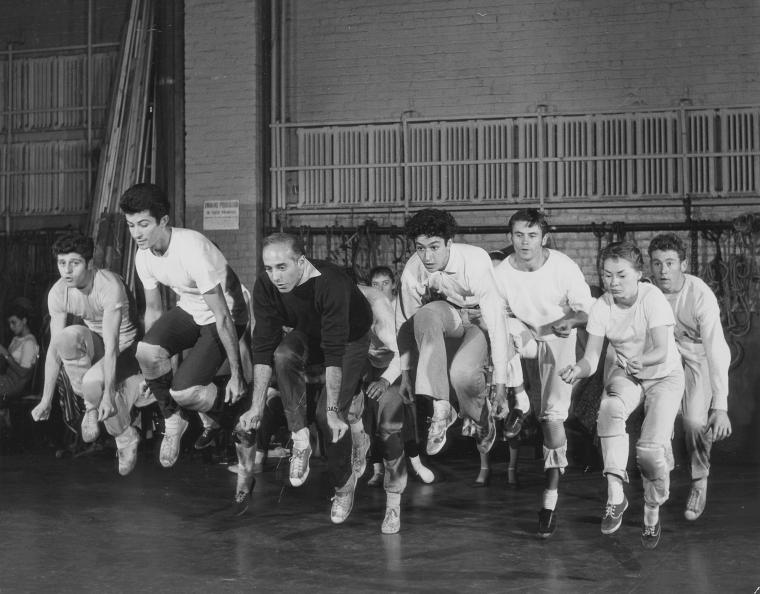Archives
Surprises in the Jerome Robbins Audio Collection
Archival collections can harbor surprises — which makes the job of processing them fun! The personal archives of artists not only document their careers and personal lives, but often contain material reflecting their interests and their times.

In March, 2011, I began work on preserving and cataloging more than 200 of these sound recordings with the help of Oral History Archive assistant Cassie Mey, and generous financial support from the Jerome Robbins Foundation. This audio collection includes working tapes relating to Robbins’s theater works, audio notebooks, and music and other recordings from his personal collection. The surprise was a number of items relating to current events of the 1950s and ‘60s, which demonstrate how Jerome Robbins was stimulated and influenced by the social and cultural ferment of these years.
In particular, Robbins was keenly interested in the civil rights movement. One treasure discovered in the audio collection is “Project 65: Mississippi Summer,” a two-hour radio documentary produced in 1965 by the Canadian Broadcasting Corporation, exploring the 1964 Mississippi Freedom Summer Project. This detailed, probing documentary allows activists and locals, blacks and whites, mayors and tenant farmers and schoolchildren to speak for themselves, creating a visceral yet thoughtful, multi-faceted portrait of the cultural and moral clash surrounding the struggle for African-American civil rights. Fannie Lou Hamer describes being beaten in a Winona, Mississippi jail; a young volunteer from Wisconsin canvases for the Mississippi Freedom Democratic Party; the president of the pro-segregation White Citizens’ Councils defends their purpose; farmer Hartman Turnbow describes his attempt to register to vote and the subsequent firebombing of his home. Produced less than a year after the events of the Freedom Summer, the documentary provides a rare contemporaneous look at the civil rights movement, long before its victory was assured.
Also in the Jerome Robbins Audio Collection is an archival recording of a 1964 gathering of the Student Non-Violent Coordinating Committee (SNCC) in Greenwood, Mississippi, at which Harry Belafonte and Sidney Poitier (who are heard on the tape delivering speeches) appeared to present funds raised for SNCC; and radio news reporting about race riots in Detroit, Milwaukee, and other cities in July, 1967.

These extremely rare sound recordings are now available for research use on-site at the Library for the Performing Arts, along with a two-hour lecture-performance by Stephen Sondheim at the 92nd Street Y in 1971, a radio interview with Lee Harvey Oswald, a recording of Arthur Miller’s biblical musical Up From Paradise, archival recordings of traditional Japanese music, and other audio materials reflecting Jerome Robbins’s wide-ranging, ever-searching intellect.
Read E-Books with SimplyE
 With your library card, it's easier than ever to choose from more than 300,000 e-books on SimplyE, The New York Public Library's free e-reader app. Gain access to digital resources for all ages, including e-books, audiobooks, databases, and more.
With your library card, it's easier than ever to choose from more than 300,000 e-books on SimplyE, The New York Public Library's free e-reader app. Gain access to digital resources for all ages, including e-books, audiobooks, databases, and more.
If you don’t have an NYPL library card, New York State residents can apply for a digital card online or through SimplyE (available on the App Store or Google Play).
Need more help? Read our guide to using SimplyE.
Comments
wonderful
Submitted by Jeremy (not verified) on May 31, 2012 - 2:03pm